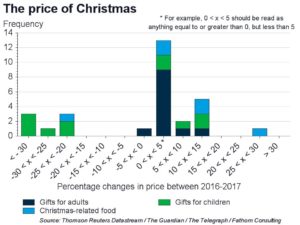A sideways look at economics
The saying “one man’s trash is another man’s treasure” may carry more weight than usual this Christmas.
For the first time in several years, the prices of goods and services have risen by more than wages, meaning that the average UK worker is worse-off in inflation-adjusted terms this year, than last. While some households will dip into their savings as a means of preserving real consumption and saving Christmas, others will opt to borrow more. But those constrained by a budget, and their Secret Santa recipients, might be left longing for Christmases past.
That £10 budget, which bought a LOL-inducing Secret Santa gift last year, is now unlikely to produce much more than a grin. All the while, we are putting more in. The UK’s unemployment rate has slipped to a 42-year low, but the impact of that tightening, which would normally feed through to pay, remains elusive.
Here’s hoping for a Christmas bonus!
This year, those buying for adults, which in Fathom HQ accounts for around 85% of all purchases and nearly 90% of the annual Christmas spend, are likely to be hardest hit. Fashion items, gadgets and experience-based gifts have, on average, increased in price. This is reflected by the prevalence of dark blue bars toward the right-hand side of the chart below, with the vast majority of ‘gifts for adults’ in the 0%-5% inflation bucket. Whereas children’s toys, such as Snuggles My Dream Puppy and Hatchimals have, on average, fallen in price, and have also been replaced at the top spot of ‘hottest Christmas presents’ by the likes of the Luvabella doll and PAW Patrol’s latest release.

Of course, this analysis, which compares the prices of closely-matched products between years, fails to account for quality improvements, perhaps explaining at least some of the inflationary bias of adult-based gifts within our analysis. Although improved quality does little to explain the gassy price of Brussels sprouts, which reside in the right-most bar, it is believed by some to help mitigate the UK’s dire productivity performance. But this is just one of the many measurement issues.
Feeling the pinch, an increasing number of households are turning to alternative Christmas gifts. Some are even banking on their trash being another’s treasure! Rather than purchasing something new, the re-gifting of old or unwanted items is becoming increasingly popular. Combined with making gifts, this option was favoured by a quarter of those working at Fathom, myself included.
Indeed, both the slippers that were three sizes too big and the ceramic sushi set (a bizarre gift from the mother-in-law-to-be who has witnessed first-hand the puffy eyes and fat tongue that ocean dwellers inflict) are suitable candidates from last year’s Christmas present haul. Alternatively, several years ago, when we bought our first house, we made Christmas gifts. Needless to say, my sweet-toothed grandad was delighted with his home-made peanut brittle, although he was less taken with the (ever-so-slightly-soggy) macarons.
While alternatives such as these solve the problems of Christmas, they do little for the phenomenon commonly known as the ‘productivity puzzle’. Flying under the GDP radar, the ascendency of the sharing economy, which includes the likes of Airbnb, has been criticised for contributing to the mismeasurement problem¹. While not unique to the UK, the issue finds its fullest expression here, with output per hour worked no higher than its 2007 peak.
Without revisiting old ground, and destroying the Christmas spirit, we believe that a prolonged period of emergency low interest rates shoulders much of the blame for weak productivity, and, in turn, weak wage growth. But, to the extent that measurement issues do exist, which is hardly surprising given that GDP was first devised in 1937 when economic activity was dominated by goods not services, eliminating them may help to resolve the conundrum.
How to do so, besides frequent but insufficient methodological adjustments, has been a topic of much debate in recent years. Complicated by issues of double counting and subjectivity, no clear consensus or alternative has emerged. But just as Christmas cards have been displaced by e-cards, and the 1951 film Scrooge usurped by The Muppet Christmas Carol, GDP’s time may have come!
Out with the old and in with the new this Christmas².
1. Since it tends to be cheaper than alternative accommodation services, the failure to reflect the price of Airbnb rentals in the price deflator results in the underestimation of the real value added of the accommodation sector. It is also believed that nominal Airbnb expenditures are not fully captured.
2. Beginning with the Quarterly National Accounts release on 22 December, the ONS intends to improve its estimate of GDP by combining the usual 45,000 survey responses with 0.6 million of the 1.8 million total VAT returns.